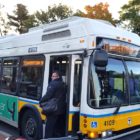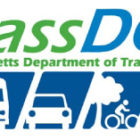Letters
OP-ED: Raising Our Rate of Investment in Transportation
|
Buses like this one on the 71 bus will get priority heading toward Harvard Square on Mt. Auburn Street in the new Cambridge-Watertown Bus Priority Pilot program. The following piece was provided by State Sen. Will Brownsberger, D – Belmont, who also represents Watertown and parts of Boston:
The MBTA’s Board heard a presentation last week from leaders of Toronto’s regional rail system. What was really stunning was how rapidly Toronto has been investing in all forms of transit improvement and expansion.
Since 2008, Toronto’s regional leadership has been engaged in a series of transit expansions which will add up to a total investment of approximately $60 billion by 2028. Annual spending has reached a level over $4 billion in some years. Four billion dollars in well-managed transit investments within one year represents staggering progress. In Massachusetts, we have struggled to raise our annual investment to $1 billion per year on transit. In private and public meetings officials ask constantly whether we can move more quickly, but again and again the answer has been that we don’t have the planning and management capacity to do so.




